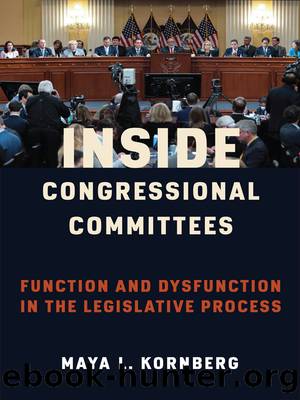Inside Congressional Committees by Maya Kornberg

Author:Maya Kornberg
Language: eng
Format: epub
Tags: POL006000, POLITICAL SCIENCE / American Government / Legislative Branch, POL016000, POLITICAL SCIENCE / Political Process / General
Publisher: Columbia University Press
Published: 2023-02-14T00:00:00+00:00
Staff Education
No less important than committee member learning are the members of the personal staff of the members of Congress (who attend more frequently than their bosses!), many of whom told me that they come to the hearings to learn, and this in turn affects their work for their respective members. This effect reaffirms previous work about the significance of staff members in the study of congressional learning. Richard Hall explains that âmuch of what the members do in person is prefigured by the options and information that staffers supply. . . . The study of legislative participation, then, must extend not only to the member but to the enterprise.â8 Jesse Crosson et al. echo this point in their study of congressional staff, writing that âstaffers serve as a legislatorâs engines of policy production, as they draft bills, seek out cosponsors, meet with lobbyists and network with other key staffers.â9
The staff members reflected on how important hearings can be in teaching them about topics. A personal staffer on the House Agriculture Committee said, âSome of these witnesses have very narrow expertise. They bring that technical expertise that I would not get somewhere else.â The other staff interviews confirmed this observation, each underscoring how they learn from hearings.
The information that staffers learn affects members of Congress in several ways. First, the staffers learn in order to inform their bosses. One personal staffer on the House Science Committee said, âWhat matters more than what [the congressman] hears from the witnesses is what I hear from the witnesses because he is relying on me to pay closer attention because it is my job to advise him.â A Democratic congressman on the House Science Committee underscored the importance of staff learning. In his opinion, staff briefings are one of the most effective learning tools because the staffers in attendance learn and shape their bossesâ behavior. Both he and Doudna, the renowned expert on genetic editing and former witness, referenced a staff briefing that arose as a result of that hearing. They both spoke of the importance of this briefing, citing its ability to educate staffers, who would then inform the congressional members. A staffer on the Senate Finance Committee explained, âYou are there to do your research, make sure youâre prepared for everything that may come up and that the member is not surprised by anything or caught off guard by anything. . . . [You want to make sure that the member] knows what to expect and really is just looking their smartest right at the committee.â Carol Weissâs in-depth study of committee staff dynamics uncovered a similar trend. She writes that âstaff know that their bosses do not want to be taken by surprise. If new evidence becomes public of which she is not aware, and if that evidence is cited to support the oppositionâs argument, there are going to be complaints about staff work.â10 Weissâs account highlights the importance staffers place on obtaining information to inform their bosses. One of the
Download
This site does not store any files on its server. We only index and link to content provided by other sites. Please contact the content providers to delete copyright contents if any and email us, we'll remove relevant links or contents immediately.
The Secret History by Donna Tartt(16718)
The Social Justice Warrior Handbook by Lisa De Pasquale(11506)
Thirteen Reasons Why by Jay Asher(7833)
This Is How You Lose Her by Junot Diaz(5829)
Weapons of Math Destruction by Cathy O'Neil(5078)
Zero to One by Peter Thiel(4867)
The Myth of the Strong Leader by Archie Brown(4809)
Promise Me, Dad by Joe Biden(4478)
Beartown by Fredrik Backman(4464)
How Democracies Die by Steven Levitsky & Daniel Ziblatt(4447)
Stone's Rules by Roger Stone(4438)
The Fire Next Time by James Baldwin(4372)
100 Deadly Skills by Clint Emerson(4106)
A Higher Loyalty: Truth, Lies, and Leadership by James Comey(4059)
Rise and Kill First by Ronen Bergman(4043)
The David Icke Guide to the Global Conspiracy (and how to end it) by David Icke(3913)
The Farm by Tom Rob Smith(3894)
Secrecy World by Jake Bernstein(3806)
The Doomsday Machine by Daniel Ellsberg(3758)
